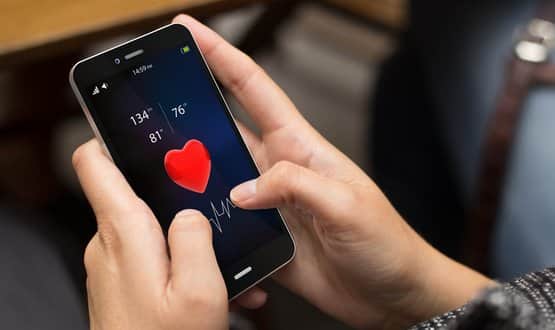Smartphone ECG recorder is ‘fives times better at spotting heart problems’

A smartphone-based ECG recorder is five times more effective at diagnosing heart problems than standard tests, new research has suggested.
The British Heart Foundation (BHF) and Chest Heart and Stroke Scotland (CHSS), which joint funded the research, are calling for greater use of the devices in emergency departments.
Researchers at the University of Edinburgh and NHS Lothian conducted the first trial of the AliveCor KardiaMobile device in 243 people presenting with heart palpitations across 15 emergency departments across the UK.
Clinicians using the device were able to diagnose the cause of palpitations in more than 40 per cent more patients than standard tests alone.
Diagnosing the exact underlying cause of heart palpitations is often difficult.
An electrocardiogram (ECG) is used to detect the hearts rhythm and diagnose the patient, but often by the time a patient has made it to A&E their heart rhythm has returned and their ECG is normal.
Researchers gave 124 patients the KardiaMobile, which is stuck to the back of a smartphone or tablet and activated by the patient when they experience palpitations.
The ECG result can then be sent electronically to a doctor to help diagnose the problem.
The 116 patients not given the device underwent standard tests and follow-up and, if undiagnosed, were asked to attend the Emergency Department or their GP surgery if they experienced further symptoms.
After 90 days ECGs taken by the smartphone device allowed doctors to diagnose 56% of patients in an average of 9.5 days, compared to only 10% of patients given standard care diagnosed in an average of 43 days.
Professor Jeremy Pearson, associate medical director at BHF, said: “By taking advantage of the tech that we carry around in our pockets every day, this cutting-edge device makes sure that it’s easy for people experiencing palpitations to directly record their heartbeat.
“They can then relay the information rapidly to a doctor and improve their diagnosis.
“This device could spare people from further anxiety, save the NHS money and, more importantly, save lives.”
The British Heart Foundation has recently provided funding to the University of Cambridge to develop a machine learning tool that helps predict a person’s risk of heart attack or stroke.
It’s one of several projects to share in £550,000 worth of funding, jointly provided by The Alan Turing Institute, for projects aiming to transform how we diagnose heart and circulatory conditions.
If you want to hear more about what the BHF is up to, chairman, Doug Gurr, is a keynote speaker for Digital Health Rewired in March 2019.
Gurr will be explaining how the medical research charity is now focusing investment in at scale data research in order to achieve a transformational breakthrough in the prediction and prevention of heart disease.
Register your place for Rewired today.





1 Comments
What is the ‘standard care’ against which this is judged? 24hr ecg monitoring with conventional equipment? Or just attend hospital if they get palpitations, but they have stopped while there, so can’t be assessed?
Comments are closed.